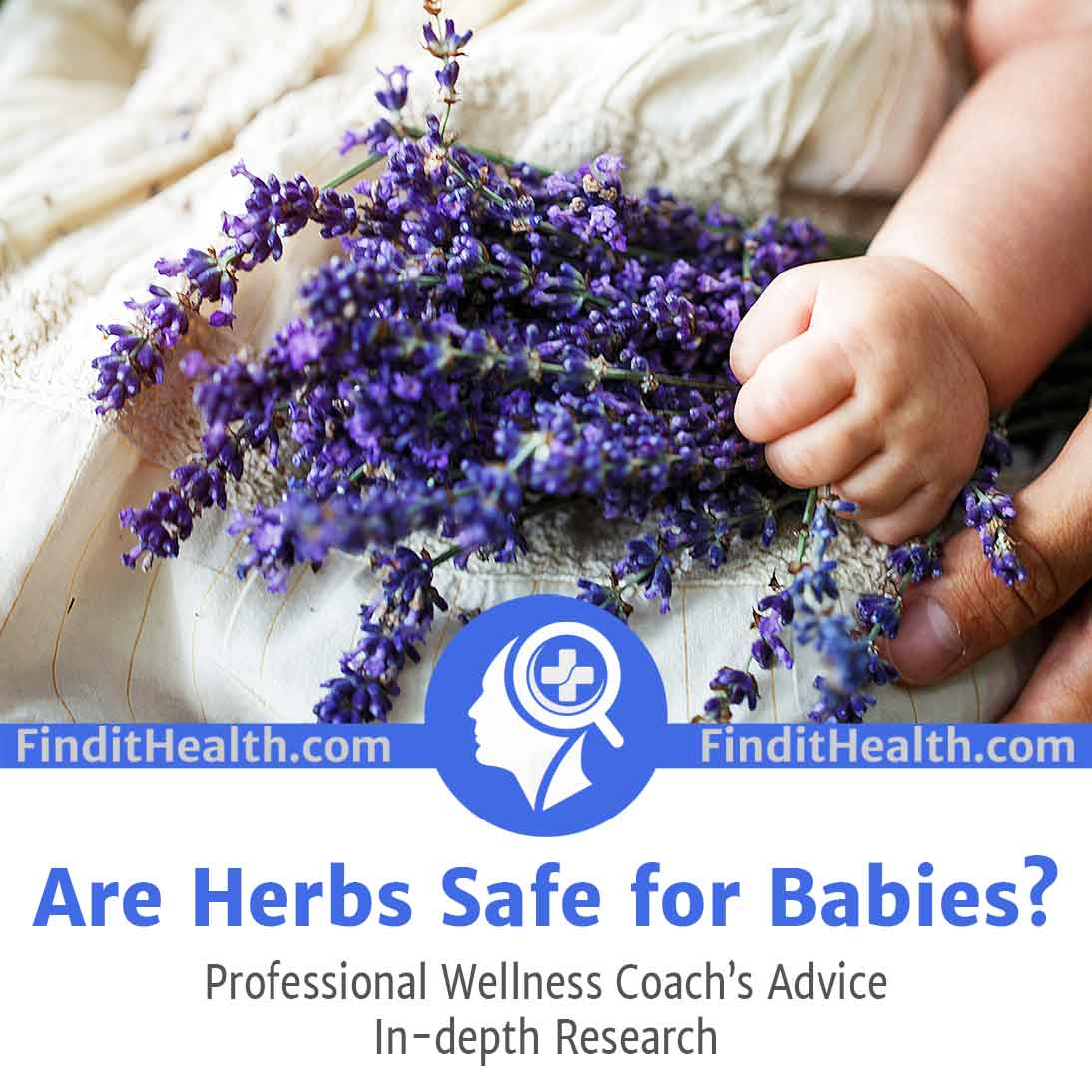
As head of the wellness coach team at Find It Health, I’m committed to providing you with evidence-driven insights.
When it comes to the well-being of our little ones, there’s no room for uncertainty. With so much information available, sorting through what is reliable can be a difficult task.
But fear not. Our team has invested in in-depth research, ensuring that the answers we provide stem from a foundation of credible data and genuine care. Let’s address this pressing question and lay your concerns to rest. The short answer is yes, most herbs are safe for babies given that their medical professional is consulted before letting them take herbs. This allows medical professionals to know if the herbs contradict any medication or if your baby is allergic to certain herbs.
Scientific Consensus
Introducing herbal remedies into a baby’s diet or care routine is a topic rife with discussions. The scientific consensus emphasizes caution, primarily because of the risks involved. Here’s a closer look at the core findings:
- Allergic Reaction: Just as with introducing a variety of food, there’s a potential for allergic reactions when introducing herbs, especially fresh herbs. A baby’s immune system is still developing, making it harder for them to combat any adverse effects effectively.
- Herbs For Babies: While some herbs might be deemed safe for adults or older children, the same cannot be applied universally for infants. Many herbal remedies have not undergone rigorous testing on babies, making their safety questionable.
- Breastfed Babies: Mothers consuming certain herbal products might inadvertently introduce those compounds to their breastfed babies. This can be risky, as what might be harmless for the mother could be potent for the infant.
- Variety Of Food: Before introducing herbal remedies, it’s recommended to have already established a variety of food in the baby’s diet. This way, the baby’s system has been exposed to different food proteins, lessening the shock of a new compound.
- Herbal Product Quality: Not all herbal products are created equal. The concentration of compounds in herbal remedies varies, and without standardized dosages, giving the correct amount to an infant becomes a game of uncertainty.
While the popularity of herbal remedies for various infant ailments is strong, the prevailing scientific consensus leans towards caution.
Before considering any fresh herbs or herbal products for babies, consultation with a pediatric specialist is paramount to ensure the child’s safety and well-being.
SUBSCRIBE for FREE STRESS MANAGEMENT TECHNIQUES from our EXPERT COACHES!
Good Herbs For Babies
When it comes to herbal remedies, especially for our children, it can be tricky to sort through the various options.
However, specific herbs have been time-tested and found safe and beneficial for babies. Here’s a concise rundown:
1. Mint Leaf: Known as a gentle herb for kids, mint is not just a refreshing aromatic spice but offers several health benefits. In mild amounts, mint can aid digestion and soothe upset tummies, making it an excellent herb for baby use.
2. Chamomile: This is a herb championed for its mild sedative properties. A chamomile tea, when administered in appropriate amounts, can help soothe a cranky baby, aiding in sleep. Its anti-inflammatory nature also helps in reducing symptoms of a bacterial infection in the respiratory tract.
3. Lavender: Beyond its lovely scent, lavender has healing properties that are gentle enough for a baby’s delicate skin. A diluted lavender oil can be a remedy for diaper rash or used as a calming agent before bedtime.
4. Calendula: Recognized for its healing properties, calendula is especially beneficial for skin ailments. It’s a go-to herb for kids dealing with minor cuts or skin irritations, thanks to its anti-inflammatory and antimicrobial properties.
5. Fennel: This herb is often used to combat colic in babies. A mild fennel tea can relieve gas, making it a favorite among many parents to ease their baby’s discomfort.
6. Thyme: Known for its strong antiseptic properties, thyme can help in battling bacterial infections, especially those related to the respiratory tract.
While the health benefits of these herbs are evident, it’s crucial to ensure the right dosage and preparation to maintain the safety and well-being of the child.
SUBSCRIBE for FREE STRESS MANAGEMENT TECHNIQUES from our EXPERT COACHES!
Herbs That Aren’t Safe For Babies
While some herbs offer immense health benefits, others can be perilous for infants due to their concentrated compounds or adverse side effects. Here’s a brief overview of herbs to avoid:
1. Eucalyptus: Although commonly used for respiratory ailments in adults, eucalyptus can be overpowering for infants, potentially causing respiratory distress.
2. St. John’s Wort: Widely used for mood disorders in adults, this herb can lead to severe colic and drowsiness in babies.
3. Ginkgo Biloba: Renowned for its cognitive benefits for adults, Ginkgo Biloba can pose a risk for infants by leading to digestive troubles.
4. Aloe Vera: Consumed internally, aloe can be too intense for a baby’s stomach, causing diarrhea and abdominal cramps.
5. Ginseng: Suitable for boosting energy in adults, this herb can overly stimulate an infant, leading to irritability.
When considering herbal remedies for babies, it’s paramount to differentiate between what’s beneficial and what’s potentially harmful.
As always, before introducing any herb, even those considered safe, always consult with a pediatric healthcare professional. This ensures that your baby gets the benefits without the potential hazards.
Frequently Asked Questions
What herbs are not safe for babies?
Certain herbs, including eucalyptus, St. John’s Wort, Ginkgo Biloba, aloe vera when consumed internally, and ginseng, are not recommended for babies due to potential side effects such as respiratory distress, colic, digestive troubles, and irritability.
When can babies have fresh herbs?
Babies can be introduced to fresh herbs around the age of 6 months, typically when solid foods are introduced. However, always start with small amounts and watch for any adverse reactions.
Is herbal medicine safe for babies?
Herbal medicine can be safe for babies, but it’s crucial to consult with a pediatric healthcare professional before introducing any herbal remedies. The dosage and type of herb matter significantly when considering safety for infants.
Is Rosemary safe for babies to eat?
Yes, Rosemary is generally safe for babies to eat when introduced as a part of their solid food diet. However, it should be given in moderation and finely chopped or cooked to ensure it’s easily digestible. Always watch for any allergic reactions when introducing a new food.
Conclusion
Based on the thorough research and analysis conducted by Find It Health researchers, there’s a fine line between beneficial and potentially harmful herbs for babies.
While some herbs can offer significant advantages, like aiding digestion or soothing colic, others can pose risks. Therefore, parents and caregivers need to be informed and always consult healthcare professionals before introducing any herbal remedies to an infant’s regimen.

